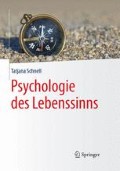Zusammenfassung
Bisher wurden die Lebensbedeutungen eher überblicksartig beschrieben. In diesem Kapitel geht es darum, sie im Detail zu betrachten. Sie erfahren, welche Lebensbedeutungen das stärkste Sinnstiftungspotenzial aufweisen, welche Auswirkungen die Anzahl, die Unterschiedlichkeit und die Tiefe der Lebensbedeutungen auf das Sinnerleben haben und wie die verschiedenen Sinnquellen im Alltag gelebt werden.
Access this chapter
Tax calculation will be finalised at checkout
Purchases are for personal use only
Bibliographie
Schnell, T. (2015). Predicting meaningful and pleasurable daily activities: Findings from an experience sampling study. Presentation, Inaugural International Convention of Psychological Science, March 2015, Amsterdam, Netherlands
Schnell, T., & Becker, P. (2007). Der Fragebogen zu Lebensbedeutungen und Lebenssinn (LeBe). Göttingen: Hogrefe
Erikson, E. H. (1988). Der vollständige Lebenszyklus. Frankfurt/Main: Suhrkamp
Schnell, T. (2011a). Individual differences in meaning-making: Considering the variety of sources of meaning, their density and diversity. Personality and Individual Differences, 51(5), 667–673
Thoits, P. A. (2003). Personal Agency in the Accumulation of Multiple Role-Identities. In P. J. Burke, T. J. Owens, R. Serpe, & P. A. Thoits (Hrsg.), Advances in Identity Theory and Research (S. 179–194). New York: Kluwer Academic/Plenum
Thoits, P. A., & Evenson, R. J. (2008). Differential labeling of mental illness revisited: Patterns before and after the rise of managed care. Sociological Forum, 23(1), 28–52
Heine, S. J., Proulx, T., & Vohs, K. D. (2006). The meaning maintenance model: On the coherence of social motivations. Personality and Social Psychology Review, 10(2), 88–110
Reker, G. T., & Wong, P. P. (1988). Aging as an individual process: Toward a theory of personal meaning. In J. E. Birren, & V. L. Bengston (Hrsg.), Emergent theories of aging (S. 214–246). New York, NY: Springer
Ruschmann, E. (2011). Transcending towards transcendence. Implicit Religion, 14(4), 421–432
Koltko-Rivera, M. E. (2006). Rediscovering the later version of Maslow’s hierarchy of needs: Self-transcendence and opportunities for theory, research, and unification. Review of General Psychology, 10(4), 302–317
Frankl, V. E. (1987). Ärztliche Seelsorge: Grundlagen der Logotherapie und Existenzanalyse. Frankfurt/Main: S. Fischer
VPRT (2015). TV-Verweildauer pro Tag in Minuten. http://www.vprt.de/thema/marktentwicklung/marktdaten/mediennutzung/tv-nutzung/content/tv-nutzung-2014?c=2 [Stand: 11.12.2015].
Schnell, T. (2008a). Deutsche in der Sinnkrise? Ein Einblick in die Sinnforschung mit Daten einer repräsentativen Stichprobe. Journal für Psychologie, 16 (3), Article 09
Schnell, T. (2010b). Religiosität und Spiritualität als Quellen der Sinnerfüllung. In C. Klein, H. Berth, & F. Balck (Hrsg.), Gesundheit – Religion – Spiritualität. Konzepte, Befunde und Erklärungsansätze. (S. 259–271). Weinheim: Juventa
Rassin, E., & Koster, E. (2003). The correlation between thought–action fusion and religiosity in a normal sample. Behaviour Research and Therapy, 41(3), 361–368
Pargament, K.I. (1997). The Psychology of Religion and Coping. New York: Guilford
Emmons, R. A., Colby, P. M., & Kaiser, H. A. (1998). When lossses lead to gains: Personal goals and the recovery of meaning. In P.T.P. Wong, & P.S. Fry (Hrsg.), The human quest for meaning (S. 163–178). Mahwah, NJ: Erlbaum
Emmons, R. A. (2005). Striving for the sacred: Personal goals, life meaning, and religion. Journal of Social Issues, 61, 731–745
Gebauer, J. E., Sedikides, C., & Neberich, W. (2012). Religiosity, social self-esteem, and psychological adjustment on the cross-cultural specificity of the psychological benefits of religiosity. Psychological Science, 23(2), 158–160
Schnell, T. (2012a). Spirituality with and without religion – differential relationships with personality. Archive for the Psychology of Religion, 34, 33–61
King, M., Marston, L., McManus, S., Brugha, T., Meltzer, H., & Bebbington, P. (2013). Religion, spirituality and mental health: Results from a national study of English households. The British Journal of Psychiatry, 202(1), 68–73
Schnell, T. (2008b). Implizite Religiosität. Vielfalt von Lebensbedeutungen in religiösen Ausdrucksformen. In W. Gräb & L. Charbonnier (Hrsg.), Individualisierung – Spiritualität – Religion: Transformationsprozesse auf dem religiösen Feld in interdisziplinärer Perspektive. (S. 83–107). Berlin/Münster: LIT
Schnell, T. (2011b). Experiential validity: Psychological approaches to the sacred. Position Paper. Implicit Religion, Special Issue ‘Implicit Religion and Psychology: Connections‘, 14(4), 387–404
Miethge, C. (2014). Mit ohne Gott? Sieben Einsichten, woran man alles glauben kann. Gütersloh: Gütersloher Verlagshaus
Becker, C. L. (1932/2003). The heavenly city of the eighteenth-century philosophers. New Haven, CT: Yale University Press
Zuckerman, P. (2007). Atheism: contemporary numbers and patterns. In M. Martin (Hrsg.), The Cambridge companion to atheism (S. 47–65). New York: Cambridge University Press
duden.de (2015). Mission. http://www.duden.de/rechtschreibung/Mission#Bedeutung1. [Stand: 11.12.2015].
Sherine, A. (2008). All aboard the atheist bus campaign. The Guardian, 21. October 2008. http://www.theguardian.com/commentisfree/2008/oct/21/religion-advertising [Stand: 11.12.2015].
Harris, S. (2006). 10 myths – and 10 truths – about atheism. Los Angeles Times, 24. December 2006
Edgell, P., Gerteis, J., & Hartmann, D. (2006). Atheists as “other”: Moral boundaries and cultural membership in American society. American Sociological Review, 71(2), 211–234
Altemeyer, B., & Hunsberger, B. (2006). Atheists: A groundbreaking study of America's nonbelievers. Amherst, NY: Prometheus
Schnell, T., & Keenan, W.J.F. (2011). Meaning-making in an Atheist World. Archive for the Psychology of Religion, 33(1), 55–78
Schnell, T. (2014c). Dimensions of Secularity (DoS): An open inventory to measure facets of secular identities. International Journal for the Psychology of Religion. http://dx.doi.org/10.1080/10508619.2014.967541 [Stand: 11.12.2015
Tillich, P. (1975). In der Tiefe ist Wahrheit. Religiöse Reden, 1. Folge. Stuttgart: Evangelisches Verlagswerk
Author information
Authors and Affiliations
Corresponding author
Rights and permissions
Copyright information
© 2016 Springer-Verlag Berlin Heidelberg
About this chapter
Cite this chapter
Schnell, T. (2016). Lebensbedeutungen – Quellen des Lebenssinns. In: Psychologie des Lebenssinns. Springer, Berlin, Heidelberg. https://doi.org/10.1007/978-3-662-48922-2_6
Download citation
DOI: https://doi.org/10.1007/978-3-662-48922-2_6
Published:
Publisher Name: Springer, Berlin, Heidelberg
Print ISBN: 978-3-662-48921-5
Online ISBN: 978-3-662-48922-2
eBook Packages: Medicine (German Language)

